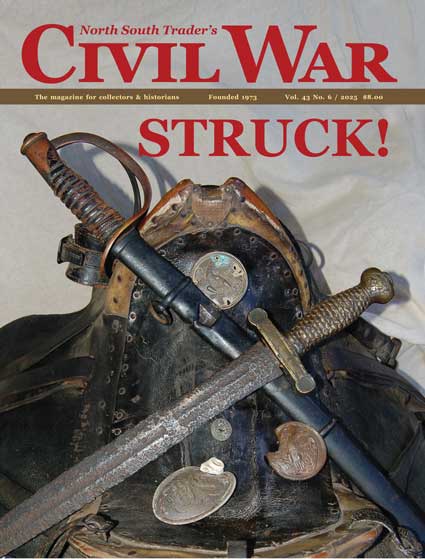|
Publisher's Forum Issue: 37-4 |
|
Sesquicentennial inspiration Historians
have deliberated about the National Park Service's efforts to restore some
battlefields to their wartime appearance. Battles about accuracy have been refought with the discovery of
additional bits and pieces of newly discovered information. Heritage defenders have marched in defense
of the integrity of century-old museum charters. Reenactors have debated which flags should be
carried at which battle. Collectors
have held vigils praying for a restoration of relic prices to Centennial-era
evaluations.
Kidding
on that last aside, one of the most common topics of contention is what might
have happened had the South been victorious. Speculation about that began the day after Lee surrendered and continues
to this day.
In
1960, Pulitzer Prize-winning author MacKinlay Kantor wrote "If the South Had
Won the Civil War,” which was printed in Look magazine and published in book
form the following year. Kantor's keen
insight brought the political and social issues together in a compelling tale
of "What if?" Having served in World War
II as a news correspondent who witnessed the horrors of war and concentration
camps, Kantor was able to see beyond the simplicities of surface facts. His prize-winning fictional account of
Andersonville, inspired by his wartime observations, brought him international
acclaim. He brought those same powers of
observation and perception into play in his tale of Southern victory in the War
Between the States.
When
I was a youngster during the Centennial, much of Kantor's vision eluded me, but
given the sense of nationalism that pervaded in the Centennial era, I recall being
somewhat conflicted about his conclusion about a peaceful postwar
disunion. I just couldn't imagine the
North and the South being two separate nations. As one nation, we had saved the world---twice. We were united by a new highway system that
made nationwide travel accessible and appealing. Television was making us all laugh and cry
and applaud the same things from Maine to southern California. We were about to conquer space. America ruled the universe and everyone knew
it.
Fifty
years later I find myself utterly amazed that the cohesiveness and national
pride of that era is gone. A half
century of assaults, both within and without, by those seeking a bigger slice
of the pie for themselves or someone they believed deserved it has brought us
to our knees.
Unlike
the schism of 1860, today's isn't a geographic separation but wholly
ideological ones. America today seems as
divided as it was in 1860---or worse. At
least in 1860, Americans were united by a common sense of national pride, an
adherence to traditional values, and a common moral compass. We were separated primarily by politics and
the economies of different geographic areas. Today, it seems we have less in common than we did 150 years ago. Sure, we're still separated by politics and economics,
but were are also splintered into scores of factions of self-descriptions and
self-interest: poor, rich, young, old, gay, straight, pretty, ugly, smart,
stupid, fat, anorexic, believers in God, athiests, and those who simply hate
everyone.
One
would think that commemorating the 150th anniversary of the war might finally
cement the once divided America. It
might give us cause to pause and dwell on all that unites us. With a black president, a man whose
dedication to unity for the world garnered him the world's highest award for
being a force for peace among men, we should by now have made inroads in that
direction. Instead, it seems we have
allowed ourselves to be led in the opposite direction. We have disunity, suspicion of government,
fear, and, yes, racism.
In this atmosphere, I find myself earnestly
wondering: Would we have been better off if Kantor's whimsical vision were
true?
But
that is fiction. Given that the current
state of affairs is reality, we must ask ourselves: What can we do about
it? We don't have the options of 1861
available to settle our differences. We
must seek another solution. We must examine anew what unites us as a people and
as a nation. The only hope we have for
drawing back from the abyss of a gloomy future is to take responsibility for
improving our own plight and those of our families, our neighbors, our
communities, our state, and our nation.
I
know that may seem like just so much rhetoric, but the solid fact is that no
president, no governmental agency, no social program, and no new law is going
to lift us up. Only we can accomplish
that.
For
inspiration and solutions, we need look no further than the men and women of
honor in our past. There are many to
choose from. Our history is rich with
individuals whose character, sacrifices, and accomplishments were beyond
reproach. Our past offers blueprints for
success, unlike the unproven rhetoric of a contemporary pundit with a gift of
gab.
We
must embrace the mantle of responsibility in the same fashion as our forebears
once did. We must exchange ideas. We must talk and write and talk some
more.
And
we must complain. Our founders changed
the world before the days of mass communication. They did it by talking and writing, one at a
time, day after day, without letup. Can
we not do the same? Can we afford not
to?
We
should use this 150th Sesquicentennial as a springboard to infuse one another
with hope, the hope that dwells within each of us. The hope that makes us get up and go to work
each morning, the hope that makes us have children, the hope that inspires us
to think positively about possibilities, the hope that makes us believe in a
bright future.
--- Pub.
|
| Past Publisher's Forums click an issue number to view |
| 43-6 |
| 43-5 |
| 43-4 |
| 43-3 |
| 43-2 |
| 42-3 |
| 42-3 |
| 42-3 |
| 42-3 |
| 42-3 |
| 41-6 |
| 41-5 |
| 41-1 |
| 40-5 |
| 40-4 |
| 40-3 |
| 40-1 |
| 39-6 |
| 39-5 |
| 39-4 |
| 39-3 |
| 39-2 |
| 39-1 |
| 38-3 |
| 38-2 |
| 38-1 |
| 37-6 |
| 37-5 |
| 37-3 |
| 37-2 |
| 37-1 |
| 36-9 |
| 36-6 |
| 36-5 |
| 36-4 |
| 36-3 |
| 36-2 |
| 36-1 |
| 35-6 |
| 35-5 |
| 35-4 |
| 35-3 |
| 35-2 |
| 35-1 |

